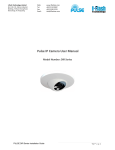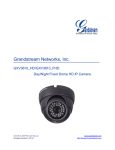Download Pulse IP Camera User Manual 3.0.1.2_for User(P2DS)
Transcript
Pulse P2DS Series User Manual Pulse IP Camera User Manual Model Number: P2DS Series Revision: 3.0.1.2 1|Page Pulse P2DS Series User Manual Safety Instruction These instructions are intended to assist users with the operation of the P2DS and also to instruct on how to avoid dangerous situations or damage to the device. Warnings: Serious injury or death may be caused if any of the warnings below are neglected. Cautions: Injury or damage to the equipment may occur if any of the following caution messages are neglected. Warnings Follow these safeguards to prevent serious injury or death. Cautions Follow these precautions to prevent potential injury or material damage. Warnings: Input voltage should meet both the SELV (Safety Extra Low Voltage) and the Limited Power Source with DC 12V according to the IEC60950-1 standard. Please refer to the technical specifications for more details. Do not use a third-party power adapter or power cord When the device is installed on the wall or ceiling, make sure that it is firmly attached. 2|Page Pulse P2DS Series User Manual Notice: • Make sure that the power supply voltage is correct before using the camera. • Do not drop the device or expose it to physical shock. • Do not expose the device to temperatures outside the range of -10 °C to +50°C when the device is in operation. • Do not expose the device to damp/wet conditions or high electromagnetism radiation. • To avoid heat accumulation, make sure that your operating environment has proper ventilation. • Do not attempt to open, disassemble, or modify the device • A few parts (e.g. electrolytic capacitor) of the equipment shall be replaced regularly according to their average life time. The average life time varies from the differences between operating environments and usage history. Regular maintenance checks are recommended for all users. Please contact your dealer for more details. 3|Page Pulse P2DS Series User Manual Contents Welcome ………………………………………………………………………………………………………………… Package Contents ………………………………………………………………………………………………… Product Overview ………………………………………………………………………………………………… Configuring the P2DS via Web Browser ……………………………………………………… Access P2DS Web Configuration Menu ……………………………………………… Connect The Camera to DHCP server …………………………………………………………… Connect to the Camera using Static IP …………………………………………………………… Home Web Page …………………………………………………………………………………………… System Page ………………………………………………………………………………………………… Video & Audio Page …………………………………………………………………………………….. Networking Page…………………………………………………………………………………………… DDNS Page……………………………………………………………………………………………………. SIP Page…………………………………………………………………………………………………………. Status Page ………………………………………………………………………………………………….. User Management Page ………………………………………………………………………………….. Maintenance Page ………………………………………………………………………………………… SMTP Page ……………………………………………………………………………………………………. FTP Page ………………………………………………………………………………………………………. Alarm HTTP Server Setting……………………………………………………………………………. Motion Detection Page ………………………………………………………………………………… System Log …………………………………………………………………………………………………… 5 6 7 10 10 10 11 12 14 15 16 19 21 23 25 26 27 28 29 30 32 4|Page Pulse P2DS Series User Manual Welcome The P2DS is a next generation mini IP dome camera for remote monitoring and surveillance over your LAN or internet. The P2DS combines best in class IP video technology and SIP protocols for a robust IP surveillance solution. The product features H.264 video streams with up to 30 frames per second in full D1, delivering rich image clarity at rapid transmission rates. Integrated SIP can pass alarms to the PSTN, mobile phones, SIP IP phones, SIP videophones and enables 2-way VoIP communication. The P2DS ensures ease of use, integration and deployment with a multilingual graphical user interface. The P2DS can be quickly installed and connected to your network and accessed from anywhere over the internet. i-Flash Technology flexible video management software enables users to monitor multiple environments in one easy to use application. The intuitive web interface lets users easily access, manage, view and record live video streams from the device. The P2DS is a powerful solution for small to medium sized offices, homes and storage facilities looking to safeguard their valuables. 5|Page Pulse P2DS Series User Manual Package Contents Items in the package: • • P2DS IP Camera Quick Installation Guide and Software CD P2DS IP Camera Quick Installation Guide and Software CD 6|Page Pulse P2DS Series User Manual Product Overview P2DS Camera Connectors and Cables Network: 10/100 Switch LAN Port for connecting to Ethernet Power – 12V DC Power Jack Reset Button – Reset the Camera Connectors and Cables (With Audio) Audio: Audio Input Network: 10/100 Switch LAN Port for connecting to Ethernet Power – 12V DC Power Jack Reset Button – Reset the Camera 7|Page Pulse P2DS Series User Manual P2DS Key Features Video Compression H.264 HP、JPEG, Motion JPEG Image Sensor 1/3.2”, 2-Megapixel CMOS, 1,600Hx1,200V Lens 1/3", M12 MEGA, f=3.6 mm, F=1.8 (Selectable) Day/Night IR Light and IR-CUT control (Optional) Min. illumination 0.5Lux Min. illumination Response 1.0V/lux-sec (550nm) Max Video Resolution 1600x1200 Max Frame Rate 6 fps 1600x 1200, 25fps at 1280x720, 30fps at 800x460, 640x360, 480x270, 320x180 and 240x135 Pixel Dynamic Range 71dB, with ( SNRMAX = 42.3dB) Video Output NTSC or PAL Complex video signal Frame Rate 10-30fps Video Compression Type Video Stream / Complex Video Stream Compressed Video Output rate 16Kbps - 2Mbps Audio Input MIC IN (optional) Audio Output Linear output (LINEOUT,600Ω, Optional) Audio Compression Standard G.711 Audio Compression Rate 16-96kbps,support8-16KHz Network Connection RJ45 10M/100M Ethernet Power 12VDC or PoE with Splitter Operation Temperature -10°C – 45°C Operation Humidity 10–90%(non-condensing) Dimension 107 mm diameter Weight ~ 450g 8|Page Pulse P2DS Series User Manual Installation Guide Minimum Recommended System Requirement • Windows 2000 Server Professional, Windows XP, Windows Vista, Windows 7 • CPU: Intel Pentium 4 or higher, 2 GHz. • RAM: 1 GB (4 GB recommended for larger systems). • Support for DirectX 8.0 and above. Connect your P2DS Using the Power adapter as power supply • Connect an RJ-45 cable to the NETWORK port of the P2DS. • Connect the other end of the RJ-45 cable to your network or PC. • Connect the power supply to the DC 12V power jack on the back of the P2DS. • Connect the other end of the power supply with 12VDC 1A minimum to a wall outlet (not included) Using PoE as power supply with PoE Splitter (not included in Package): • Connect an RJ-45 to the NETWORK port of P2DS. • Connect the other end of the RJ-45 cable to a PoE switch. NOTE: If you are going to connect the device to a hub/switch/router, please use a straight-through cable. A cross over cable should be used if you are going to connect the device directly to a PC. 9|Page Pulse P2DS Series User Manual Configuring the P2DS via Web Browser The P2DS’s embedded Web server responds to HTTP/HTTPS GET/POST requests. Embedded HTML pages allow you to configure your IP camera through Microsoft Internet Explorer. Access P2DS Web Configuration Menu Connect the Camera to DHCP server. 1. Run the Search tool provided in Software CD 2. Click on button in order to begin device detection 3. The detected devices will appear in the Output field 4. Start Internet Explorer on your computer 5. Enter device IP in the address bar of the browser or double click the camera in Search tool 6. Enter the administrator user name and password to access the Web Configuration Interface 7. The default user name and password are both set to admin. 8. IE will indicate that “This website wants to install the following add-on: 9. Install this add-on by following the instructions in IE. 10. You will see the home page. 10 | P a g e Pulse P2DS Series User Manual Connect to the Camera using Static IP If the camera does not get response from DHCP server after 3 minutes, it can be accessed by the default IP 192.168.1.168. 1. Connect your PC to the same network as the P2DS. 2. Configure the IP address of your PC to: 192.168.1.XXX (1<XXX<255) and configure the subnet mask to 255.255.255.0. 3. Make sure that the device is turned on and connected to the network. 4. Start Internet Explorer on your computer. 5. Enter 192.168.1.168 in the address bar of the browser. 6. Enter the administrator user name and password to access the Web Configuration Interface 7. The default user name and password are both set to admin. 8. IE will indicate the add-on required that Install this add-on by following the instructions in IE. 9. You will see the home page. 11 | P a g e Pulse P2DS Series User Manual P2DS Home Web Page 1 Motion Detection 2 Control Console 3 4 5 6 ZOOM Focus PTZ Speed Default 7 BRIGHTNESS If the motion detection alarm is triggered, the indicator will flash red. Click on the indicator to turn off the alarm. PTZ Console controller. PTZ device needs to be connected. (not supported in P2DS) Zoom control (not supported in P2DS ) Adjust focus of image (not supported in P2DS) Adjust PTZ Speed (not supported in P2DS) Click this option to reset the video brightness, contrast, and saturation to their factory default configuration. Adjusts the image brightness. 12 | P a g e Pulse P2DS Series User Manual 8 9 CONTRAST View Size 10 11 12 13 Configuration Language Play / Stop Capture 14 Record 15 16 17 18 Sound Off/On Talk Playback Config Adjusts the image contrast Resize the image to fit into the window panel in the home scream Camera Configuration Setting Select language – English or Chinese Plays/Stops the video. Captures the image displayed and saves it to C:\GS_Capture (default directory). Records the video and saves it to C:\GS_Record (default directory). Toggles the sound On or Off Establishes two-way audio Replays the saved video Configures the Save Location for captured images and recorded videos. 13 | P a g e Pulse P2DS Series User Manual P2DS System Page The page allows you to configure the system setting on P2DS Current System Time - displays the current date and time (24h clock). Set the System Time • • • • Update via NTP Server - the camera will obtain the time from an NTP server Specify the NTP server's IP address or host name. And you can select your time zone from the drop-down list or define your own time zone setting. o NOTE: If using a host name for the NTP server, a DNS server must be configured under Basic Settings -> Networking. Synchronize with Local Computer - sets the time from the clock on your computer. Set the Time Manually - this option allows you to manually set the time and date. OSD Date Format - set the format of date on OSD 14 | P a g e Pulse P2DS Series User Manual 15 | P a g e Pulse P2DS Series User Manual Device Name Setting –This field lets you configure the name of the P2DS, which helps “Search” and “Surveillance” Software to identify the device in the same subnet. Video & Audio Page On Screen Display (OSD) Settings OSD Time/ Text – The time stamp and channel name displayed on the screen. 16 | P a g e Pulse P2DS Series User Manual Video Settings Preferred Video Codec Resolution Bit Rate Maximum Frame Rate Bit Rate Control Image Quality I-frame Interval – The P2DS supports the H.264 video codec. – The higher the resolution is, the better the video quality is, and higher bandwidth is required. – The number of bits that are conveyed or processed per unit of time. – The video frame rate is adjustable based on network conditions. Increasing the frame rate will increase the amount of data significantly therefore consuming more bandwidth. Video will be impaired due to packet loss when there is insufficient bandwidth. – Variable Bit rate (VBR) and Constant Bit Rate (CBR). Variable Bit Rate - If VBR is selected, the codec varies the amount of output data per time segment. VBR produces a better quality-to-space ratio. The bits available are used to enable more flexibly and encode sound or video data more accurately, with fewer bits used in less demanding passages and more bits used in difficult-to-encode passages. Constant Bit Rate - If CBR is selected, the codec’s output data is constant regardless of the input data. The output bit rate is defined in “Bit rate”. CBR is useful for streaming multimedia content on limited capacity channels. It is easier to calculate required bandwidth as well as the required storage space using CBR. If ‘Bit Rate Control’ is set to “VBR”, “Image quality” needs to be configured. The better the video quality is, the higher the bit rate will be. – While streaming video over a network, compression technologies are used to show the incremental difference between each frame. I-frames are used to help keep the video looking normal. When intervals are 17 | P a g e Pulse P2DS Series User Manual shorter, the video quality is higher but uses more bandwidth. NOTE: The users might need to configure the Primary Stream and Secondary Stream properly. Sometimes, the user might like to watch the live video stream from the web GUI in low resolution mode while recording a copy via “Surveillance System” software in high resolution due to the limitation of internet bandwidth. In this case, for example, primary stream can be configured to have better resolution, and then the users can use primary stream to record while watching secondary video streams. Audio Settings Preferred Audio Codec – The P2DS supports up to 3 different Vocoder types, a-law (PCMA), u-law (PCMU) and G.726. The audio can also be turned off by switching the setting to “Disabled” Power Frequency - this setting should match the power frequency used in the country to avoid flickering in the image 18 | P a g e Pulse P2DS Series User Manual Networking Page – Assign an IP to P2DS P2DS supports IP version 4. The IP address can set automatically via DHCP, or a static IP address can be set manually. To make P2DS work properly, the user needs to set the DNS configuration properly. For security purposes, the user can also assign the P2DS an HTTP Port other than 80 IP Address Configuration The P2DS operates in two modes: Dynamically Assigned via DHCP – all the field values for the Static IP mode are not used. The P2DS acquires its IP address from the first DHCP server it discovers on its LAN. Statically Configured as – configures all of the following fields: IP address, Subnet Mask, Default Gateway IP address, DNS Server 1 (primary), DNS Server 2 (secondary). These fields are set to zero by default. Static IP addresses are recommended for the P2DS DNS Configuration There are two methods of DNS configuration on the P2DS: 1. The P2DS can obtain the DNS server automatically 2. Users can configure their own preferred DNS server 19 | P a g e Pulse P2DS Series User Manual HTTP Port The P2DS supports user configured http ports. If the HTTP port is changed, the port number is needed to access the web GUI, for instance: http://192.168.1.168:8080. NOTE: If the HTTP Port is 80, when you add this device to Surveillance Software, the RTSP port is 554. If the HTTP Port is changed, when you add this device to Surveillance Software, please make sure the RTSP port number equals HTTP Port plus 2000. DDNS Page Dynamic DNS provides devices that have a variable, often changing IP address with a well known hostname resolvable by network applications through standard DNS queries. 20 | P a g e Pulse P2DS Series User Manual Set up DDNS 1. Apply for a domain name from your service provider. 2. Login to the web configuration page, click Basic Settings > DDNS. 3. Enter the required information • • • • • • DDNS Active – If you want to use DDNS, please set this field to “Enabled” . DDNS ISP Type – Select your DDNS ISP Type. Self-Define DDNS Address – Self-define the DDNS server instead of using DDNS ISP Type. Site Name – The DDNS name for your device. DDNS Account/ DDNS Password – The account and password from the DDNS Provider STUN Server – If the device is behind a router, a STUN server is needed to help penetrate the NAT. 4. Click Save to save the changes. You might need to reboot the device to apply all the changes. 21 | P a g e Pulse P2DS Series User Manual SIP Page The P2DS has the ability to receive phone calls and make phone calls when an alarm event is triggered through motion detection or alarm input. Register the P2DS to a SIP server to enable the product to make and receive phone calls. To make outgoing phone calls out, the user needs to configure the Phone List properly. 22 | P a g e Pulse P2DS Series User Manual Register P2DS to a SIP Server 1. From the P2DS home page, click Basic Settings > SIP. 2. Go to SIP Settings Tab. 3. General Phone Settings. Registered – The field shows the registration status of the account with the SIP server. Unregister On Reboot – If it’s checked, the SIP user’s registration information will be cleared from the server when the phone reboots. 4. Enter the required information. Account Name SIP Server Outbound Proxy SIP User ID Authenticate ID Authenticate Password STUN Server Stream Preferred Vocoder Registration Expiration Local SIP Port – The field configures the SIP account name. – The SIP Server’s IP address or Domain name provided by your service provider. – The IP address or Domain name of the Outbound Proxy, Media Gateway, or Session Border Controller. Used for firewall or NAT penetration in different network environments. If the system detects a symmetric NAT, STUN will not work. ONLY outbound proxies can provide a solution for a symmetric NAT. – User account information provided by your service provider (ITSP); this is either an actual phone number or is formatted like one. – The SIP service subscriber’s Authenticate ID used for authentication. It can be identical to or different from the SIP User ID. – The SIP service subscriber’s account password for the GXV to register to the SIP server of the ITSP. – If the device is behind a router, a STUN server is needed to help penetrate the NAT. – To choose between Primary and Secondary stream. – To choose different Vocoder type. – This parameter allows users to specify the time frequency (in minutes) in which the GXV refreshes its registration with the specified registrar. The default interval is 60 minutes. – This parameter defines the local SIP port used to listen and transmit. The default value is 5060. Local RTP Port – This parameter defines the local RTP-RTCP port pair that is used to listen and transmit. The default value is 5004. 5. Click Save to save all the changes. You need to restart the device to apply all changes. 23 | P a g e Pulse P2DS Series User Manual Configure Phone List Page To make sure the P2DS can make phone calls to the number you preferred when alarm is triggered. You need to add number to the phone list. Steps to add phone number: 1. From the P2DS home page, click Basic Settings > SIP. 2. Go to Phone List Tab. 3. Enter the Phone number and name, click Add a Number to save all the changes. 4. Numbers added to the system will be listed in this page. Status Page System Statistics System Statistics lists hardware and software information, for example, the part number, the software version, about the P2DS Hardware Version – This field contains the product’s hardware information. Part Number – This field contains the product part number information. Bootloader Version – Bootloader code version number. Core Version – Core code version number. Base Version – Base code version number. Firmware Version – Firmware code version number. 24 | P a g e Pulse P2DS Series User Manual System Up Time Since – This field shows the system up time since the last reboot. Network Status MAC Address – The device ID, in HEXADECIMAL format. LAN IP Address – This field shows the LAN IP address of the P2DS. LAN Subnet Mask – This field shows the LAN subnet mask of the P2DS. LAN Default Gateway – This field shows the LAN default gateway of the P2DS. DDNS Status – This field shows the status of DDNS. Camera Type This section shows the sensor information of P2DS. 25 | P a g e Pulse P2DS Series User Manual P2DS User Management Page All current users will be list in the User List section of this page. You can also add and remove users here. Existing User Name –The field lists all of the current users. You can insert or remove users from the list by click on the Add or Update or Delete button. User Name / Password – The user name and password required to login. Privilege – The privilege for the user to access to configuration page. Allow Anonymous Login – If ‘Allow Anonymous Login’ is set to Yes, no user name and password are required to login to the P2DS web configuration pages. If you login anonymously, you will not be able to change any settings. 26 | P a g e Pulse P2DS Series User Manual P2DS Maintenance Page Server Maintenance Restart – Click this button to restart the P2DS. Restore – Click this button to perform a partial factory reset (The IP address will not be cleared). Restore the Device Click “Restore” to reset the camera to default factory setting, except IP Address. Firmware Upgrade and Provisioning Items Upgrade via – This field lets you choose the firmware upgrade method. The P2DS supports HTTP, HTTPS and TFTP. Firmware Server Path – The IP address or domain name of the firmware server (the location of the firmware files) . Automatic Upgrade Interval – Enter the frequency (in minutes) in which the HTTP/HTTPS/TFTP server will be checked for new firmware upgrades or configuration changes. Automatic Upgrade – The default setting is “No.” Choose “Yes” to enable automatic. HTTP/HTTPS/TFTP upgrade and provisioning. When set to “No”, the IP Camera will only perform a HTTP/HTTPS/TFTP upgrade and perform a configuration check once during the boot process. 27 | P a g e Pulse P2DS Series User Manual Performing a firmware upgrade: 1. Download the firmware package from www.i-flashtech.com 2. Unzip the firmware package and copy the files to the firmware upgrade server directory. Upgrades are supported via TFTP, HTTP and HTTPS. 3. Log in to the Maintenance page of the P2DS. Select the server type from the dropdown list under the “Upgrade Via” field. Enter your server’s root directory in the “Firmware Server Path” field. 4. Reboot the P2DS to begin the firmware upgrade process. SMTP Page The SMTP server is used to send out emails when alarm event or motion detection is triggered. The SMTP settings must be configured to make sure the alarm email is sent out properly. 28 | P a g e Pulse P2DS Series User Manual SMTP Server Settings Enable SMTP – Checked to enable SMTP SMTP Server – The IP or hostname of the SMTP server, for example, smtp.gmail.com. SMTP Server Port – The port of the SMTP server. The P2DS supports port 25 and SSL port 465, which is for SMTP with an encrypted connection. From E-Mail Address – The email address that sends out the alarm email(s). To E-Mail Address – The email addresses that the alarm email(s) will be sent to. You can have up to 3 emails configured. User Name/ Password – The user name and password required to log in to your SMTP server, for example, [email protected]/123. SSL – Checked if the SMTP server requires a secure connection. Test Email Account Settings – Click the Test button to send a test email from the From E-Mail to the To E-Mail to make sure that SMTP is configured properly. If the receiver can get the test email, then the SMTP settings are ready to go. FTP Page The FTP server is used to store video files if you configure the P2DS to record video and upload it to the FTP server when an alarm event or motion detection is triggered. FTP Settings Enable FTP – The default setting is “No,” if you want the P2DS to upload the recorded video to the FTP server when an alarm is triggered, set this field to “Yes.” FTP Server – The IP address or hostname of the SMTP server, ie. ftp.myserver.com. FTP Server Port – The port that your FTP server is using. User Name / Password – The user name and password required to log into your FTP server 29 | P a g e Pulse P2DS Series User Manual Path – The directory in the FTP server where recorded video will be uploaded. Test FTP Account Settings – Click the Test button to upload a sample file to make sure that FTP is properly configured. PTZ Settings This setting is not supported in P2DS Alarm HTTP Server Settings Server Name: input the Server Name URL: input the Server IP Address User Name & Password: input User Name & Password 30 | P a g e Pulse P2DS Series User Manual Motion Detection Page The P2DS supports Motion Detection. To utilize this feature, please follow the below steps: 1. Setup the motion detection monitored area. 2. Configure the motion detection time schedule. 3. Configure alarm action properly. Setup Motion Detection Monitored Area Enable Motion Detection – If this option is selected, motion detection will be enabled. If something/somebody moves in the motion detection region, an alarm will be triggered. Show Motion Detection Regions – If this option is selected, the motion detection regions will be displayed on the screen with a white border. To Edit a Monitored Area 1. In the Select a Region dropdown list, select the region ID. 2. Click Edit. 3. Click on the video, drag and draw you preferred area. 4. Set the Sensitivity. Click the Save button to save the sensitivity. NOTE: The Sensitivity value varies from 0 to 100. The larger the value is, the higher the sensitivity. 5. Click Save to save the settings. To Remove a Monitored Area 1. In the Select a Region dropdown list, select the region you would like to remove. 2. Click Remove. 3. Click Save to save the changes. 31 | P a g e Pulse P2DS Series User Manual Configure Motion Detection Time Schedule & Alarm Actions This section allows you to configure the time during which the P2DS will monitor the motion detection. The P2DS not only can monitor your settings but also can take actions when the alarm is triggered. 32 | P a g e Pulse P2DS Series User Manual P2DS System Log This page is used to set up the system log server path and system log level. Once they are correctly configured, the device will send out system log messages to the system log server, which will help perform troubleshooting. Syslog Server – The IP address or URL of System log server. Syslog Level – Select the device to report the log level. Default is None. The level is one of Debug, Info, Warning or Error. 33 | P a g e
















































